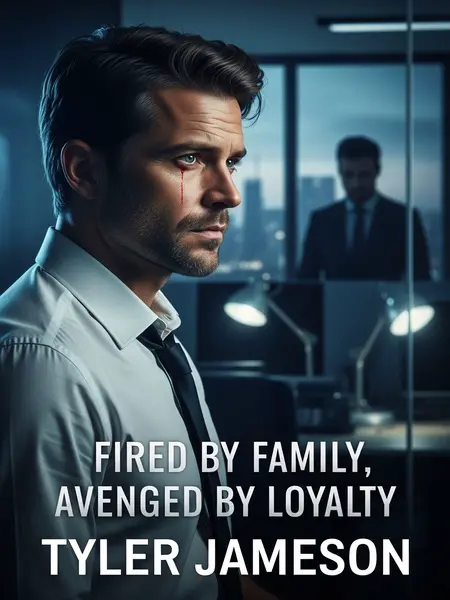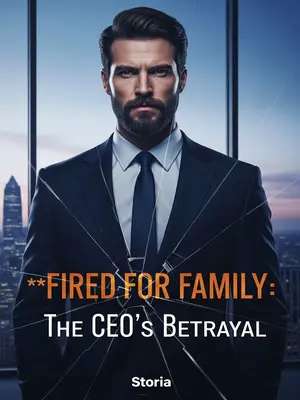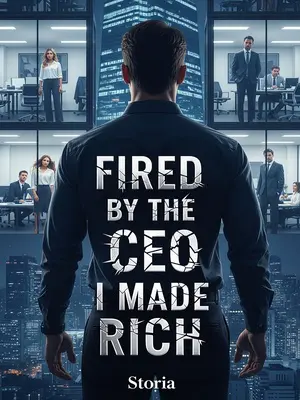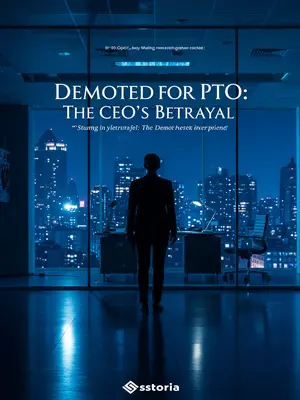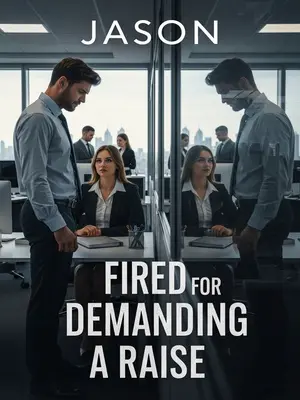Chapter 2: The Nepotism Trap
Back at the office, everything was tense.
It was like walking into a funeral parlor. Nobody was talking, just the soft clack of keyboards and the hum of the AC. I could feel the anxiety in the air.
Puzzled, I stopped Leah from tech as she hurried by, looking grim.
"What’s up today? Why does everyone look so down?"
She hesitated, glancing over her shoulder like she was afraid someone would overhear. Her voice dropped to a whisper.
"It's all because of the new supervisor's rules. If you so much as smile at work, they say it’s a bad attitude. You get fined $500 every time!"
I stared at her, mouth open. Was this a joke? Apparently not—the haunted look in her eyes said it all.
Seriously, what kind of insane rule is that?
I rubbed my temples, trying to make sense of it. This place was starting to feel more like a dystopian sitcom than a real company.
I didn’t even try to hide my disbelief. If this was the new normal, I wanted no part of it.
I knocked twice, sharp and loud, not bothering to wait for an invitation. I needed answers, and I needed them now.
"Come on in."
His voice sounded tired, almost resigned. I pushed open the door, bracing myself for another round of corporate doublespeak.
The office smelled like old coffee and paper. The boss looked up, surprise flickering across his face. For a split second, I thought maybe he was actually glad to see me.
He set down his pen, eyes searching mine for a clue about my mood. I stayed standing, arms crossed.
"You’re back so soon?"
He sounded almost hopeful, like maybe I’d brought good news.
I shrugged. "Mr. Evans agreed to sign, so yeah, I came back."
I tried to keep it casual, but I couldn’t hide the edge in my voice. I wanted him to know I’d done my job—despite everything.
The boss hesitated, and suddenly that nasal, sarcastic voice chimed in from behind me.
I stiffened at the sound. I turned slowly, not bothering to hide my annoyance.
"What the boss really wants to know is if you flew back."
Supervisor Grant leaned against the doorframe, arms folded, a smirk plastered on his face. He looked like he’d been waiting for this moment all day.
We glared at each other across the desk like two dogs circling each other.
Neither of us blinked. The tension was thick enough to cut with a knife. I could feel my blood pressure rising.
The boss just rubbed his temples helplessly.
He looked from me to Grant and back again, clearly wishing he were anywhere else. I almost felt sorry for him—almost.
"We're all on the same team here, all want the company to succeed. Let’s not make this any more tense than it already is."
His attempt at peacemaking fell flat. The room was colder than ever.
I couldn’t help it. I scoffed.
"To anyone walking by, we look like enemies, not coworkers. No flying for business, no gifts—and now you’re policing our faces. What kind of company makes rules like that?"
I let the words hang in the air, daring either of them to contradict me. This was getting ridiculous.
The boss let out an awkward laugh.
He tried to smooth things over, but the laugh died in his throat. I could see the cracks forming in his calm facade.
"Tyler, don't get so worked up. You’re both at fault here, just try to get along."
His words sounded hollow, like he didn’t even believe them himself. I bit back a retort.
From the moment Supervisor Grant hinted the boss was mad I flew back—and the boss just stayed silent—I had a bad feeling.
The silence said it all. I’d seen this movie before, and I knew how it ended.
And now it was confirmed.
I felt my stomach drop. The writing was on the wall, and it wasn’t looking good for me.
"Boss, are you saying you actually support these so-called reforms? You brought in a supervisor with no degree or experience just to micromanage us?"
I didn’t bother hiding the accusation in my voice. If he was going to back Grant, I wanted to hear him say it.
"Hey, Tyler, you’re overthinking this." The boss forced a smile.
He tried to wave it off, but the smile didn’t reach his eyes. I could tell he was scrambling for a way out.
"I'm not trying to restrict you, but you know the company's had a rough couple years. We need to shake things up. Grant’s got a lot of management experience. Under his leadership, things will get better."
He sounded like he was reading from a script. I wondered if he even believed it himself.
If anything, Grant looked even more pleased with himself.
He straightened up, chin high, as if he’d just won a prize. The smugness was almost unbearable.
"When I got here, the biggest problem I saw was that employees weren't grateful and didn’t treat the company like family, so they weren’t loyal enough. My changes are for the company's own good."
He said it like he was doing us all a favor. I had to bite my tongue to keep from laughing in his face.
I was about to argue, but the boss put on his serious face and pretended to scold him.
He furrowed his brow, trying to look authoritative. It was almost comical.
"Don't say that about Tyler. He's a veteran. Without him, we wouldn’t be where we are."
He looked at me, trying to project gratitude, but it rang hollow after everything that had happened.
Supervisor Grant nodded, all fake sincerity: "Of course, Tyler isn't ungrateful or lacking in team spirit. He's just careless with details. There are cheaper ways to travel, but he insists on flying. I already warned him last time, but he did it again. Isn't that unreasonable?"
He spread his hands as if he were the reasonable one, the voice of moderation. I clenched my jaw, refusing to rise to the bait.
After that little show, the boss turned to me, looking troubled.
He sighed, rubbing his forehead. The lines on his face seemed deeper than ever.
"I think Supervisor Grant has a point. Tyler, you've worked here for years and earned a good living. Why not just cover the flight yourself this time?"
The words hit me like a slap. I stared at him, stunned. Was he really asking me to foot the bill for a business trip?
"Boss, are you serious? I was on a business trip for the company, and you want me to pay out of pocket? What company does that?"
My voice was tight, barely controlled. I could feel the eyes of the whole office on us, even through the closed door.
The boss’s face darkened. He looked away, unable to meet my gaze.
I knew then I was on my own.
"You've been here a long time. Can’t you just be a little more understanding? Just close a few more deals, and when things get better, we'll reimburse your airfare."
He sounded tired, defeated. I almost felt sorry for him—almost.
I couldn’t help it. I snorted.
The sound echoed in the small office. I didn’t care if it was disrespectful. I was done playing nice.
"No need. I’m not paying for your airfare."
I grabbed my bag, ready to walk out. I’d said my piece.
Seeing I was really upset, the boss quickly tried to calm me down:
He reached across the desk, voice softening. "Tyler, we've known each other for years, and the company has its struggles. How about this: I’ll cover it out of my own pocket, alright?"
I paused, surprised. For a moment, the old boss—the one who used to have my back—peeked through.
I’d worked here nearly a decade. The boss used to treat me well.
I remembered the early days, when he’d bring in donuts for the team, stay late to help with big accounts. Things had changed, but maybe not entirely.
Since he was willing to throw me a bone, I didn't want to make a scene.
I nodded, swallowing my pride. There was no point burning the bridge completely—not yet.
"It's not about the airfare. It’s about the company not treating its people like actual people!"
I made sure he heard the frustration in my voice. This wasn’t just about money—it was about respect.
The boss nodded, again and again. "I get it. Grant means well. The new system’s a little much, maybe too fast. Let’s try it for a month. If people hate it, I’ll make him adjust."
He sounded almost pleading, like he knew he was asking too much. I let out a long breath, forcing myself to let it go—at least for now.
At this point, I'd look petty if I kept pushing, so I just nodded, even if I hated it.
I turned to leave, the weight of disappointment heavy on my shoulders. There was nothing more to say.
After leaving the boss's office, I was heading back to sales to sort out some client follow-ups.
I walked the hallway slowly, replaying the conversation in my head. Every step felt heavier than the last.
But halfway there, I remembered I hadn't told the boss about two extra handshake agreements from my talk with Mr. Evans.
I stopped short, mentally kicking myself. Details like that could make a difference—if anyone still cared.
So I turned around.
I hesitated outside his office, not wanting another confrontation. But business was business, so I steeled myself and pushed the door open a crack.
The office door was still half-open from when I left, and I could hear voices inside, low and sneaky.
I froze, the hair on the back of my neck standing up. Something about their tone made me pause.
The boss actually sounded pleased.
He was chuckling, a sound I hadn’t heard in a long time. I leaned closer, careful not to make a sound.
"Thanks to your ideas, we've saved so much money. How about I throw you a $5,000 bonus?"
The number hit me like a slap. All those cost-cutting measures, and now he was handing out fat bonuses to Grant?
"Thanks, bro! You’re the best, man!" Supervisor Grant's voice oozed with fake gratitude.
It clicked. The way he said "bro"—the familiarity, the lack of respect. Suddenly, everything made sense.
The realization was like ice water down my back. Nepotism, plain and simple.
So this pushy, unqualified supervisor was actually the boss's brother-in-law.
I felt sick. Years of hard work, and this was who they valued? Family over competence, every time.
No wonder he got this job with just a high school diploma and barely a couple years in a warehouse.
I remembered the rumors—how Grant had bounced around, never staying anywhere long. Now I knew why.
Anger simmered beneath the surface. I’d seen good people leave because of this exact thing, and here it was happening again.
For years, the company going nowhere was mostly thanks to the boss's nepotism.
I’d watched talented coworkers get passed over for promotions, their ideas ignored. The company had nearly gone under more than once.
He filled the place with relatives who did nothing but push around the people actually keeping things afloat.
It was like a bad sitcom—except nobody was laughing. The only people who thrived were the ones with the right last name.
So many talented coworkers left, and the company started circling the drain.
I could list them off—every single one who’d left for greener pastures. The place felt emptier every year.
Just when I was about to leave too, the boss seemed to have finally cleaned house and put in a real performance system.
For a while, things actually got better. We worked hard, earned bonuses, felt like a real team again. I almost believed the old days were behind us.
Sales picked up, morale improved, and we even landed a few big accounts. For the first time in years, I felt proud to work here.
But now, as soon as things got better, the boss started the same old tricks again.
History repeating itself. I should’ve seen it coming.
I was trying to figure out how to talk him out of it, when I heard more voices from inside.
I pressed my ear to the door, heart pounding. Whatever they were saying, it couldn’t be good.
"In a few days, I’ll do a random check on the gifts he’s getting for clients. As long as they're worth more than a couple hundred, I'll use 'taking advantage of the company' as an excuse to dock his commissions for the next two months."
The words sent a chill down my spine. They were planning to set me up—again.
"But... he already flipped out when you refused to reimburse his airfare. If you cut his commissions too, he’ll probably blow up. The company still depends on him for business!"
For a second, I almost laughed. Even Grant knew how much they relied on me, but that didn’t stop him from plotting.
"Old trick: you slip him $2,000 under the table as a personal favor. He’ll be too embarrassed to make a fuss, just like today. The commissions from the deals he brings in these two months are worth way more than a couple grand."
The casual cruelty in his voice made my skin crawl. I realized, in that moment, that I’d never truly belonged here.
Supervisor Grant sounded smug: "That’s what we call a loyalty test in management, you know?"
He actually sounded proud of himself, like he’d invented some brilliant new strategy. I wanted to storm in and tell him exactly what I thought.
The boss laughed loudly: "You young folks are clever! I've been annoyed at him giving such expensive gifts to clients for ages. If a salesperson is really that good, why do they need to give gifts? Let’s do it your way and teach these freeloaders a lesson!"
The laughter was cold, hollow. In that moment, any last shred of loyalty I felt evaporated.
I stood there, frozen at the door, slowly letting go of the handle.
My hand was numb, my heart pounding. I felt like I’d just been punched in the gut.
In that moment, I felt cold all over, like I'd just stepped into a walk-in fridge.
It was more than betrayal—it was a wake-up call. I’d given them everything, and they saw me as nothing but a leech.
After working my tail off for this company for years—always topping the charts, never taking a vacation, working late, always thinking about client relationships, even on weekends—
I remembered every late night, every missed family dinner, every time I’d gone the extra mile for a client. All for nothing.
In the end, I was their so-called 'company leech,' the target of his and his brother-in-law's schemes.
I realized, finally, that I’d been loyal to people who saw me as expendable. The anger burned away, leaving only resolve.
I got out of there fast and went back to my office.
I didn’t bother looking back. There was nothing left for me in that office—not respect, not trust, not even basic decency.
